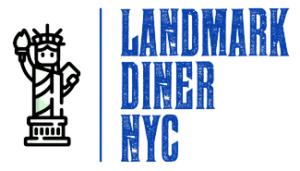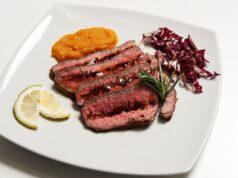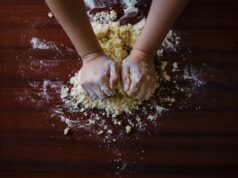Pancreatitis is a condition in which the pancreas becomes inflamed. It can be caused by gallstones, alcohol, or viral infections. Symptoms include abdominal pain, nausea, vomiting, and diarrhea. When should you eat after being diagnosed with pancreatitis?
Pancreatitis is a digestive disease that causes inflammation of the pancreas. It can be caused by alcohol or other types of pancreatitis. The pancreatitis diet food list will help you stay on track with this condition.
Patients recuperating from acute pancreatitis should start with clear liquids exclusively, such as broth or gelatin, according to Alayo. Patients may add additional meals if their bodies accept them well. Dietary recommendations for those who have had pancreatitis include: Eat a diet rich in protein and low in fat, with no more than 30 grams of fat each day.
What can you consume after pancreatitis, apart than that?
Fruits, vegetables, healthy grains, legumes, nonfat/low fat dairy, and lean cuts of meat are the healthiest foods for those with chronic pancreatitis. Avocado, olive oil, fatty fish, nuts, and seeds are examples of healthy fats that may be eaten in moderation.
Is it also true that bananas may help with pancreatitis? Until you feel better, drink clear drinks and consume bland meals. Rice, dry bread, and crackers are examples of bland meals. Bananas and applesauce are also included. Eat a low-fat diet until your pancreas is recovered, according to your doctor.
When can I eat after acute pancreatitis, apart from that?
In most cases, patients with mild acute pancreatitis do not have a high nutritional or energy demand (17). If the patient is able to eat regular meals orally after 5-7 days, enteral feeding is not required.
What should I do if I’m diagnosed with pancreatitis?
You may take measures to prolong your pancreatitis healing after you leave the hospital, such as:
- Stop consuming alcoholic beverages. If you can’t quit consuming alcohol on your own, get medical assistance.
- Quit smoking. Quit smoking if you’re a smoker.
- Make a low-fat diet a priority.
- Increase your fluid intake.
Answers to Related Questions
Is it OK to eat cheese if you have pancreatitis?
Although most kinds of cheese are rich in fat, lower-fat alternatives such as cottage cheese may not aggravate your symptoms while still providing an excellent source of protein. Grains: The majority of your pancreatitis diet should consist of fiber-rich whole grains.
What is the best way to cleanse your pancreas?
Friday Fix: Cleanses Aren’t All That They’re Cracked Up To Be
- Make sure you drink lots of water.
- Consume lots of fruits and veggies.
- Increase your fiber intake to keep your bowels regular.
- Consume probiotic foods (yogurt, sauerkraut, tempeh, etc.)
- Make sure you’re getting enough protein in your diet (protein is also part of the detox process)
Is fasting beneficial in the treatment of pancreatitis?
A diabetic pancreas may benefit from a fasting diet. According to BBC News, “the pancreas may be stimulated to rebuild itself via a kind of fasting diet.” In mice, researchers discovered that a low-calorie diet may benefit people with type 1 and type 2 diabetes.
What effect does pancreatitis have on bowel movements?
Pain in the upper abdomen, which may sometimes be felt in the back, is common in individuals with chronic pancreatitis. As a result, weight loss is a symptom of chronic pancreatitis. Due to excess fat, patients may have bulky, stinky bowel motions (steatorrhea). An “oil slick” may be observed on the toilet water from time to time.
Is gas caused by pancreatitis?
Pancreatitis is characterized by a lot of gas.
Flatulence that is accompanied with abdominal swelling, fever, nausea, and vomiting, on the other hand, is not. These symptoms may indicate pancreatitis, which is an inflammation of the pancreas, which aids with digestion. A frequent sign of pancreatitis is gas.
Is it true that coffee is harmful for your pancreas?
The pancreas has a variety of functions in the digestive and endocrine systems. Pancreatic juice, which is produced by the pancreas, includes enzymes that help the GI tract break down fats, carbs, and proteins. Coffee intake is not related to an increased risk of pancreatic cancer, according to the IARC31.
How long does it take for pancreatitis to heal?
Mild to severe pancreatitis usually clears up on its own within a week. Severe instances, on the other hand, may persist for many weeks. Chronic pancreatitis may occur if the pancreas is severely damaged in a single severe episode or many recurrent bouts.
When my pancreas is irritated, what can I eat?
Patients with pancreatitis should consume high-protein, nutrient-dense diets that contain fruits, vegetables, whole grains, low-fat dairy, and other lean protein sources to accomplish these objectives. Abstinence from alcoholic beverages and fatty or fried meals is crucial in preventing malnutrition and discomfort.
Is it OK to consume ice cream if I have pancreatitis?
Every day, drink or consume nonfat or lowfat milk, yogurt, cheese, or other milk products. Fat-free sour cream, cream cheese, or yogurt are all good options. Cream soups and cream sauces on pasta should be avoided. Low-fat ice cream, frozen yogurt, or sorbet are all good options.
How quickly can pancreatitis kill you?
Some mild instances go away on their own, but severe acute pancreatitis may lead to life-threatening consequences. The mortality rate varies from less than 5% to more than 30%, depending on the severity of the disease and if it has spread to other organs.
What is the treatment for pancreatitis?
Pancreatitis is a disease that affects the pancreas.
- a stay in the hospital to treat dehydration using intravenous (IV) fluids and, if possible, oral fluids
- If you have a pancreatic infection, you will be given pain medication and antibiotics by orally or via an IV.
- If you can’t eat, you can get nourishment via a feeding tube or IV.
After pancreatitis, how long does it take for the pancreas to heal?
Acute pancreatitis usually improves within a week, and most patients are able to leave the hospital within 5-10 days. In extreme instances, however, healing may take longer since problems that need further treatment may arise.
With pancreatitis, can I consume spicy foods?
Certain meals, on the other hand, may cause pain in pancreatic cancer sufferers. Foods with a lot of heat, such as garlic, onions, or spicy peppers. Refined/simple carbs, such as those containing high fructose corn syrup or sucrose, should be avoided, particularly if the patient has dumping syndrome.
Is it true that oranges may help with pancreatitis?
Citrus fruits (oranges and tangerines) are high in soluble fiber and vitamin C (1 serving = 1 baseball or 34 cup orange/mandarin pieces). Please with your pharmacist or doctor if you’re interested in grapefruit because of potential medication interactions.
What should I drink if I have pancreatitis?
Resting the pancreas and limiting your food intake are sometimes the best options. If you’re having a flare, your doctor may advise you to go without meals for a day or two. When pain is severe, a diet of clear liquids may be followed. Apple, cranberry, and white grape juice, as well as gelatin and broth, are clear liquids.
Is coconut water beneficial to the pancreas?
Maturated coconut water (MCW) composition utilized in the research. In conclusion, our findings show that MCW seems to have anti-diabetic action via regulating glucose and insulin levels as well as carbohydrate metabolism enzymes, as well as its protective effects on pancreatic tissue.
Why is a pancreatitis patient NPO?
The standard treatment for acute pancreatitis is to follow a NPO diet until the pain and nausea subside. This dogma is given in response to concerns that eating would increase pancreatic enzyme secretion in a pancreas that is already inflamed or damaged.
Is lemon juice beneficial to the pancreas?
Lemons – Sour fruit, such as lemons, encourages the pancreas to produce important digestive enzymes. Limes and kiwi fruit are also beneficial to the pancreas’ proper functioning. Licorice Root – is thought to be an effective treatment for a variety of pancreatic problems.
Is it true that strawberries may help with pancreatitis?
Dark, green vegetables, red berries, blueberries, sweet potatoes, grapes, carrots, walnuts, and pomegranates are all high in antioxidants. Avocado, olive oil, fatty fish, nuts, and seeds should all be consumed in moderation.
Pancreatitis is a serious condition that can cause pain, fever, and vomiting. In order to recover from the issue, it is important to follow a liquid diet for pancreatitis.
Frequently Asked Questions
How long after pancreatitis can you eat?
You should not eat for at least six hours after you were diagnosed with pancreatitis.
What can you eat after pancreatitis?
Pancreatitis is a common condition where the pancreas becomes swollen and inflamed. It can be caused by many things, including injury, bacterial infection or pancreatic cancer. The most common treatment for pancreatitis is rest, pain medication and fluids to help with dehydration.
How long should I fast with pancreatitis?
You should fast for as long as your doctor recommends.
Related Tags
- can i eat oatmeal with pancreatitis
- can you eat eggs with pancreatitis
- scrambled eggs and pancreatitis
- diet for acute pancreatitis with abdominal pain
- are bananas good for pancreatitis




